

A global vision on the future of libraries (or how 32,063 librarians can’t be wrong) Last Monday the International Federation of Library Associations and Institutions, IFLA, presented the first results of their ambitious global vision discussion. Over the past year, IFLA has worked with tens of thousands of librarians from all over the world to identify the challenges and opportunities for the library field, its enduring values and purpose, its boldest ideas and most effective local actions. The summary of this process is a highly inspirational document, and not only for libraries. IFLA’s global vision discussion is a genuinely bottom-up process that has given a voice to all types of librarians and library workers. 100 Great Ideas for the Future of Libraries. Co-authored by Francine Madera, MADERA inc.
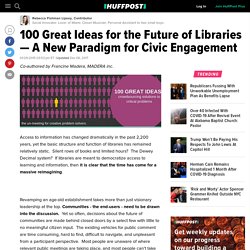
Access to information has changed dramatically in the past 2,200 years, yet the basic structure and function of libraries has remained relatively static. Silent rows of books and limited hours? Tools, Publications & Resources. The Center for the Future of Libraries works to identify trends relevant to libraries and librarianship.
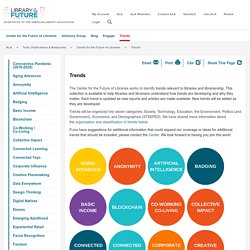
This collection is available to help libraries and librarians understand how trends are developing and why they matter. Each trend is updated as new reports and articles are made available. New trends will be added as they are developed. Trends will be organized into seven categories: Society, Technology, Education, the Environment, Politics (and Government), Economics, and Demographics (STEEPED).
We have shared more information about the organization and classification of trends below. If you have suggestions for additional information that could expand our coverage or ideas for additional trends that should be included, please contact the Center. The Compassionate Makerspace Grief and Healing in a High School Library Mak...: EBSCOhost. Notice for Faculty & Staff Student information, including grades, registration and enrollment status, and other personally identifiable information may not be disclosed to any third party without the student's written permission in compliance with Family Educational Rights & Privacy Act (FERPA) regulations.
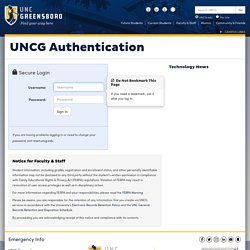
Violation of FERPA may result in revocation of user access privileges as well as in disciplinary action. For more information regarding FERPA and your responsibilities, please read the FERPA Warning. Please be aware, you are responsible for the retention of any information that you create via UNCG services in accordance with the University's Electronic Records Retention Policy and the UNC General Records Retention and Disposition Schedule. MAKERSPACES FOR ALL: SERVING LGBTQ MAKERS IN SCHOOL LIBRARIES: EBSCOhost. Notice for Faculty & Staff Student information, including grades, registration and enrollment status, and other personally identifiable information may not be disclosed to any third party without the student's written permission in compliance with Family Educational Rights & Privacy Act (FERPA) regulations.
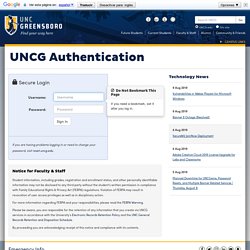
Violation of FERPA may result in revocation of user access privileges as well as in disciplinary action. For more information regarding FERPA and your responsibilities, please read the FERPA Warning. Please be aware, you are responsible for the retention of any information that you create via UNCG services in accordance with the University's Electronic Records Retention Policy and the UNC General Records Retention and Disposition Schedule. Makerspaces and the School Library Part 1: Where Creativity Blooms: EBSCOhost. Professional Development Considerations for Makerspace Leaders, Part One: A...: EBSCOhost. Notice for Faculty & Staff Student information, including grades, registration and enrollment status, and other personally identifiable information may not be disclosed to any third party without the student's written permission in compliance with Family Educational Rights & Privacy Act (FERPA) regulations.
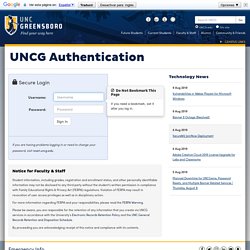
School Library Makerspaces: EBSCOhost. Standards Alignment. Cyberbullying Research Center - How to Identify, Prevent, and Respond. EJ1078204. EJ1078204. You Cant Go Home Again.pdf. One account.
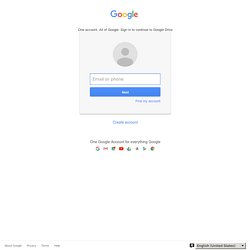
All of Google. Sign in to continue to Google Drive Find my account Forgot password? Sign in with a different account Create account One Google Account for everything Google. Minecraft.pdf. Digital Citizenship. (65) Google Tools. Free Technology for Teachers. Solutions built for teachers and students. The database “thing” state-by-state. Mashable. MakeUseOf - Technology, Simplified. Chapter 4: Current Technology Trends: How to Prepare and When Not to Pursue: EBSCOhost. Notice for Faculty & Staff Student information, including grades, registration and enrollment status, and other personally identifiable information may not be disclosed to any third party without the student's written permission in compliance with Family Educational Rights & Privacy Act (FERPA) regulations.
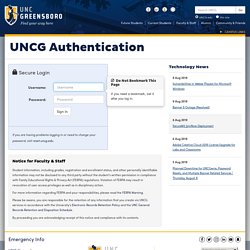
Library 2.0 Virtual Conferences - SJSU - School of Information. The San José State University School of Information is organizing three Library 2.0 web conferences during 2019, each focusing on a specific topic addressed by experts in the information profession.
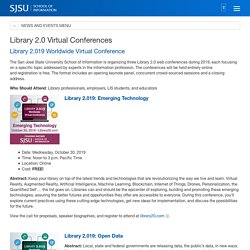
The conferences will be held entirely online and registration is free. The format includes an opening keynote panel, concurrent crowd-sourced sessions and a closing address. Who Should Attend: Library professionals, employers, LIS students, and educators Library 2.019: Emerging Technology. AASL eCOLLAB. Tools, Publications & Resources. Staff development is a broad term used describe the job-related continuing education of employees in an organization.
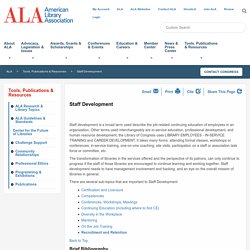
Other terms used interchangeably are in-service education, professional development, and human resource development; the Library of Congress uses LIBRARY EMPLOYEES - IN-SERVICE TRAINING and CAREER DEVELOPMENT. It takes many forms: attending formal classes, workshops or conferences; in-service training, one-on-one coaching, site visits, participation on a staff or association task force or committee, etc. The transformation of libraries in the services offered and the perspective of its patrons, can only continue to progress if the staff of those libraries are encouraged to continue learning and working together.
Staff development needs to have management involvement and backing, and an eye on the overall mission of libraries in general. Best Websites for Teaching & Learning. Best Websites for Teaching & Learning honors websites, tools, and resources of exceptional value to inquiry-based teaching and learning.
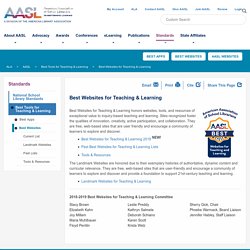
Sites recognized foster the qualities of innovation, creativity, active participation, and collaboration. MakeUseOf - Technology, Simplified. Mashable. The database “thing” state-by-state. YouTube. 16 Curation Tools for Teachers and Students. KQNovDec12 OE TAGS. Basic Screen Capturing Tools and Techniques for Collaboration. One of the most simple and effective tools for sharing on-screen concepts and ideas in today’s technology-driven world is screen capture. In fact, it’s a tool I’ve come to use just about every day to communicate with my colleagues and clients. A picture is worth 1,000 words, as they say – and capturing an image from your computer screen allows you to communicate what you’re seeing – and why it matters – to another person in a way that eliminates the need for a long, wordy email explanation.
To help you get the most out of this often-overlooked tool, here are some ways I’ve come to use screen captures to collaborate, as well as some of the best tools out there to make it happen. Sharing information It’s not uncommon to want to share something you’ve seen or read with another person on your team. Presentations. What Is A Storyboard And Why Do You Need One? In this guide, we will be discussing everything you need to know about storyboards. Let’s dive in: When you make a video for your business, be it an explainer video, marketing video, sales video, microlearning video, or any short online business video, planning is extremely important. One of the most important stages of planning out your video is creating a storyboard.
What is a Storyboard? A storyboard is a graphic representation of how your video will unfold, shot by shot. It’s made up of a number of squares with illustrations or pictures representing each shot, with notes about what’s going on in the scene and what’s being said in the script during that shot. A storyboard is your roadmap when you make a video. How to Create the Perfect Public Service Announcement.
What do you want the world to know? That's the central question asked when you are creating a public service announcement (PSA), which is any message promoting programs, activities or services of federal, state or local governments or the programs, activities or services of non-profit organizations. Often in the form of commercials and print ads, PSAs are created to persuade an audience to take a favorable action. Storyboarding. Home > Shooting Guide > Pre-filming > Storyboarding Well planned videos look the most professional.
Storyboarding is the process of creating a visual script, or draft, of the shots and scene changes in a video or movie. This tutorial explains the storyboarding process, outlines the most common items found on a storyboard, and aims to provide guidelines for you to create your own. Storyboards are invaluable when several people are working on a project together. A well-defined storyboard helps to ensure that everyone understands the goals of the project and how the video and audio footage should work together. Technology Theories. ADDIE Model Explained [INFOGRAPHIC] ASSURE model - Learning Theories ETC547 Spring 2011. What Is It? The ASSURE model is a six-step Instructional Systems Design (ISD), intended to help teachers utilize technology and media in the classroom. ASSURE is a way to ensure that the learning environment is appropriate for students.
What is Design Thinking and Why Is It So Popular? PadWheel Poster V4. Future Ready Librarians™ - International Society for Technology in Education. Home. Framework for Information Literacy for Higher Education. Filed by the ACRL Board on February 2, 2015. Adopted by the ACRL Board, January 11, 2016. This work is licensed under a Creative Commons Attribution-NonCommercial-ShareAlike 4.0 International License. PDF Version Print copies may be purchased from the Association of College and Research Libraries for $15.00 for a package of 10, including standard postage.
Frequently Asked Questions About APA Style® General Format. Note: This page reflects the latest version of the APA Publication Manual (i.e., APA 7), which released in October 2019. The equivalent resource for the older APA 6 style can be found here. Please use the example at the bottom of this page to cite the Purdue OWL in APA. To see a side-by-side comparison of the three most widely used citation styles, including a chart of all APA citation guidelines, see the Citation Style Chart.
You can also watch our APA vidcast series on the Purdue OWL YouTube Channel. General APA Guidelines. Smore Newsletters for Education. A Faculty/Staff Library Newsletter. Libraries matter: 18 fantastic library infographics and charts. Library infographics presented below clearly show that being a librarian today is not about surviving any longer. The best infographic tools from around the web. Knowledge and skills for the digital era academic library. This section discusses the findings from this exploratory study in relation to the literature reviewed and based on this discussion draws conclusions in response to the research question: What key knowledge and skills are required for LIS professionals to effectively and efficiently practise in a digital era academic library in South Africa? A secondary purpose of this preliminary investigation was to tease out some of the parameters for the wider study targeting the development of a comprehensive skills statement for higher education libraries in South Africa.